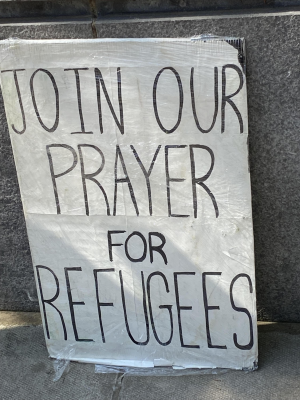Reflection for Home Office Vigil - 18 March 2024

Not casting stones
We come here month after month, to pray for asylum seekers and to mark the deaths of those whom the system has failed. We pray, like the importunate widow, each time, for justice for refugees, for a welcome for these strangers. What more can we be doing that we are not already doing?
I thought about today's reading, and the woman who apparently deserved stoning, and Jesus's reluctant conclusion: 'Let he who is without sin cast the first stone.'
I wonder if there is a danger that we can look as though we are blaming government for all the ills of the asylum and immigration system. Yet we have a tiny part to play.
We are here as Christians, but also as citizens, who have a degree of freedom of speech, the right to assemble, the right to share our views, although we know that all of these cannot be taken for granted. And a vote. We have an election coming up, probably in the Autumn.
Our message, month after month, is surely that a politics of compassion must be applied to the whole asylum system. This system is national, European and global, and the crisis of people on the move needs to be seen as a huge humanitarian crisis. This was done after the Second World War, but also after the Vietnam war, when more than 1.3 million people were resettled.
I looked up some suggestions for policy, and found on Amnesty International site the following eight pointers:
Safe routes to sanctuary
2) Resettle most vulnerable
3) Save lives
4) Crossing borders: allow people to cross borders without papers, as they flee from danger.
5) Stop trafficking
6) Stop blaming refugees for domestic problems
Governments need to stop blaming refugees and migrants for economic and social problems, and instead combat all kinds of xenophobia and racial discrimination.
7) Start funding an impoverished UN, which has not even enough money to deal with the famine crisis in the Sudan for instance.
8) Asylum is a human right
The world has a very short memory. In the aftermath of World War II, most countries agreed to protect refugees through the 1951 Refugee Convention, and through UN agencies like the UNHCR.
Barbed wire fences and chronic underfunding have left that vision of a better world in tatters. By ignoring the warning signs, world leaders have allowed a huge, global humanitarian crisis to unfold. Ultimately, it will be resolved by ending the conflicts and persecution that forced people to flee in the first place.
But no one knows when that will be. Meanwhile, we need radical solutions, visionary leadership and global co-operation on a scale not seen for 70 years. That involves setting up strong refugee systems: allowing people to apply for asylum, treating their refugee claims fairly, resettling the most vulnerable of all, and providing basics like education and healthcare.
None of these eight solutions are impossible to achieve, if politicians listen to the millions of people saying "refugees welcome", and put solidarity and compassion above petty wrangling over who should host a few thousand refugees'.
My own thoughts on the local domestic level are obvious:
- stop throwing money at walls and fences and spend it instead on improving the claims system, using the money to enable the - Home Office to deal with the huge backlog of applications.
- Stop putting people in detention for indefinite periods, treating them like prisoners, and instead let them go out to work, including while they await a hearing of their applications.
As Simon Jenkins of the Guardian says:
'Our plight is rich in absurdity. The UK needs new workers and people want to come here. The real problem is populist politics'.
In other words, the fears planted in people about invasion by strangers is simply a tool of a party faction using biased media, and should be dealt with as such.
But overall, as Clive Myrie, of the BBC says: 'we need international cooperation to solve a global crisis'.
Which brings me to the central idea behind all of these measures: Compassion and humanity. The theme for Refugee Week this year is Compassion.
What we are doing here in Marsham Street is praying for an international politics of compassion. And whatever we are getting involved in, whether hospitality, campaigning, accompaniment or befriending, we are praying that the umbrella idea over all of it, is compassion, not numbers, not expediency, identity politics or anything else. The alternative is the deaths we have just heard read out. It does not have to be like this.
With a general election coming up, might we think of doing our part, and coming up with a sort of Charter of Compassion for refugees, Might we do our own writing on the ground, as to what to put forward on how we might address this global crisis, and not be accused of simply casting stones at the Government?
The things we pray for, Lord, give us the grace to labour for!


















